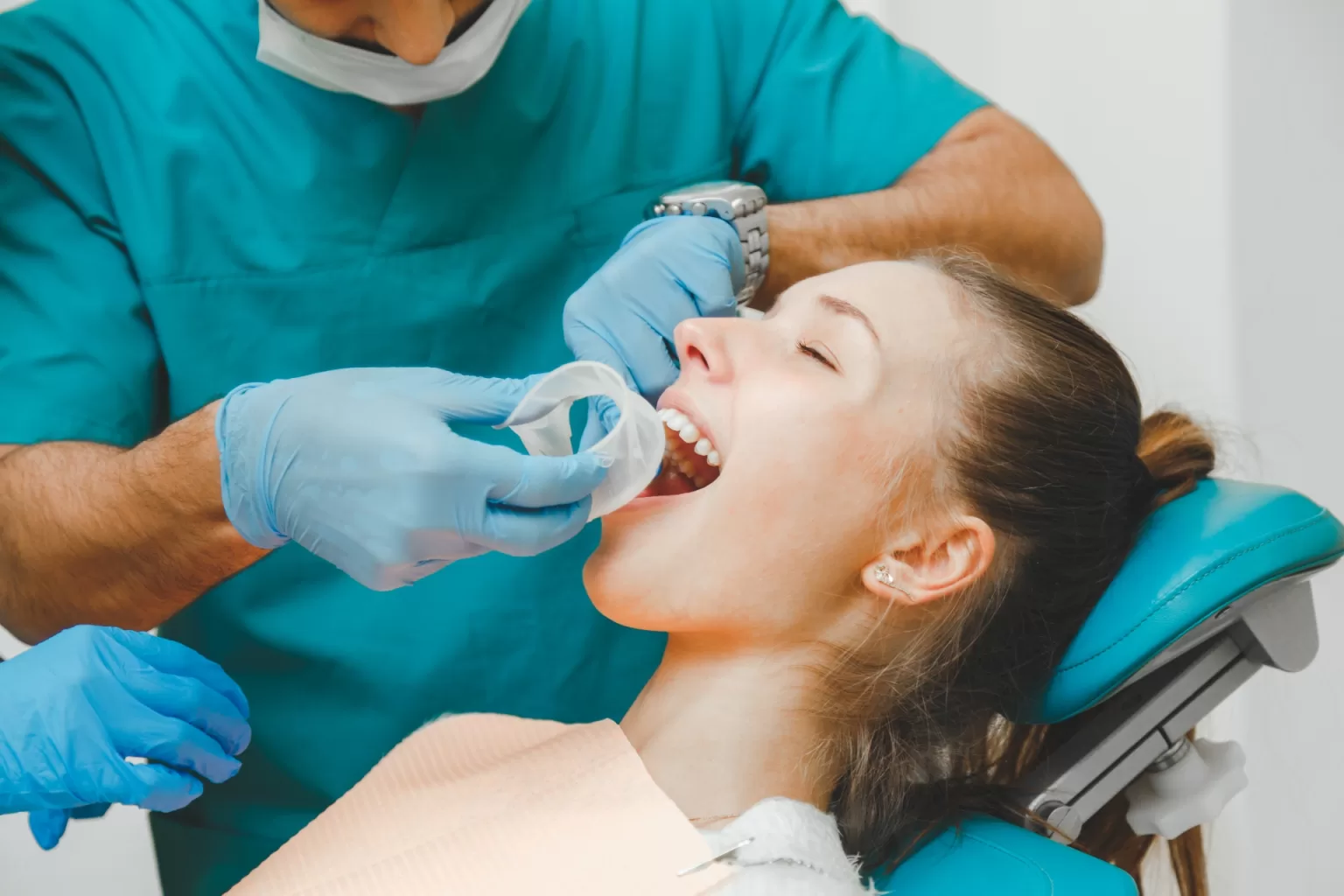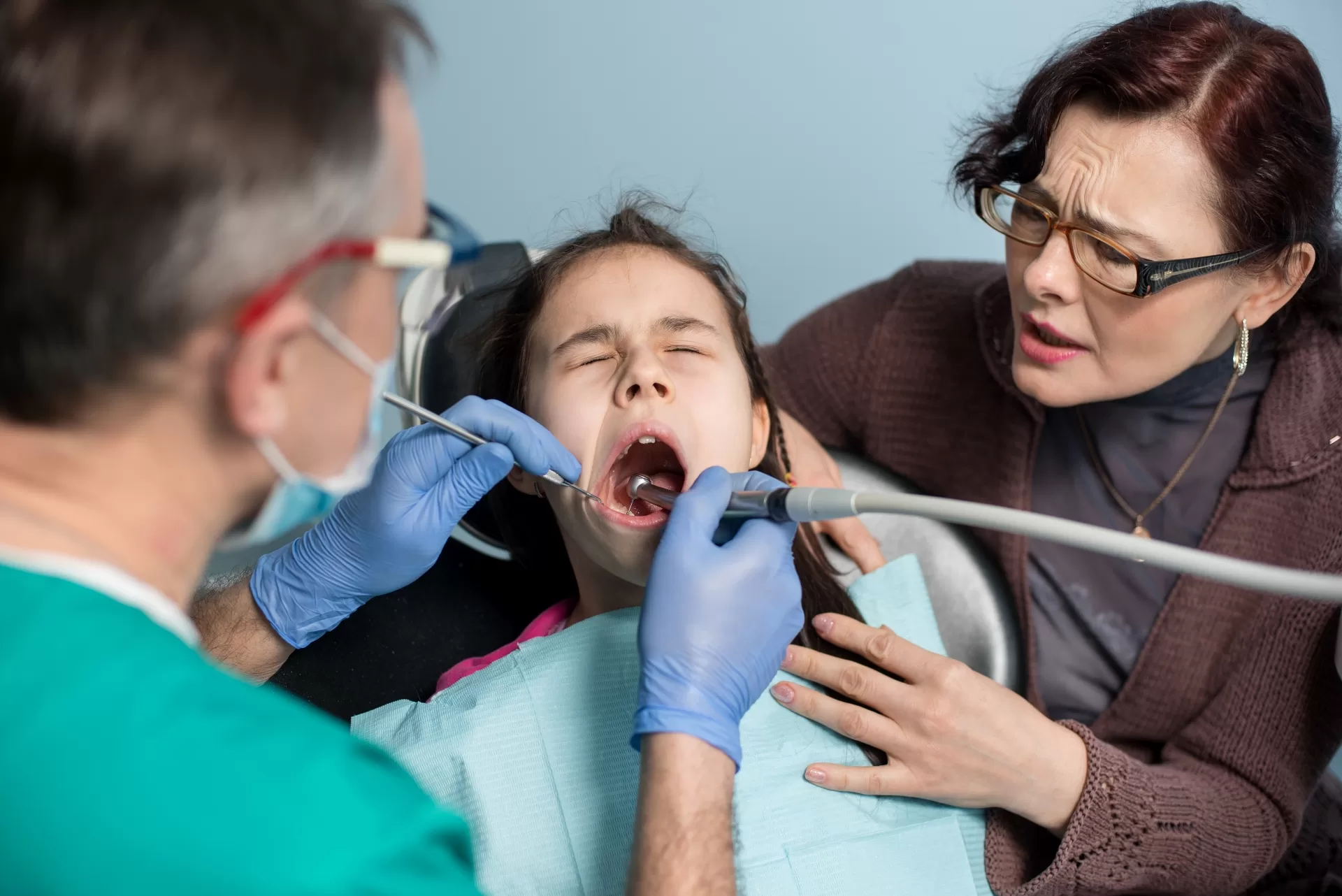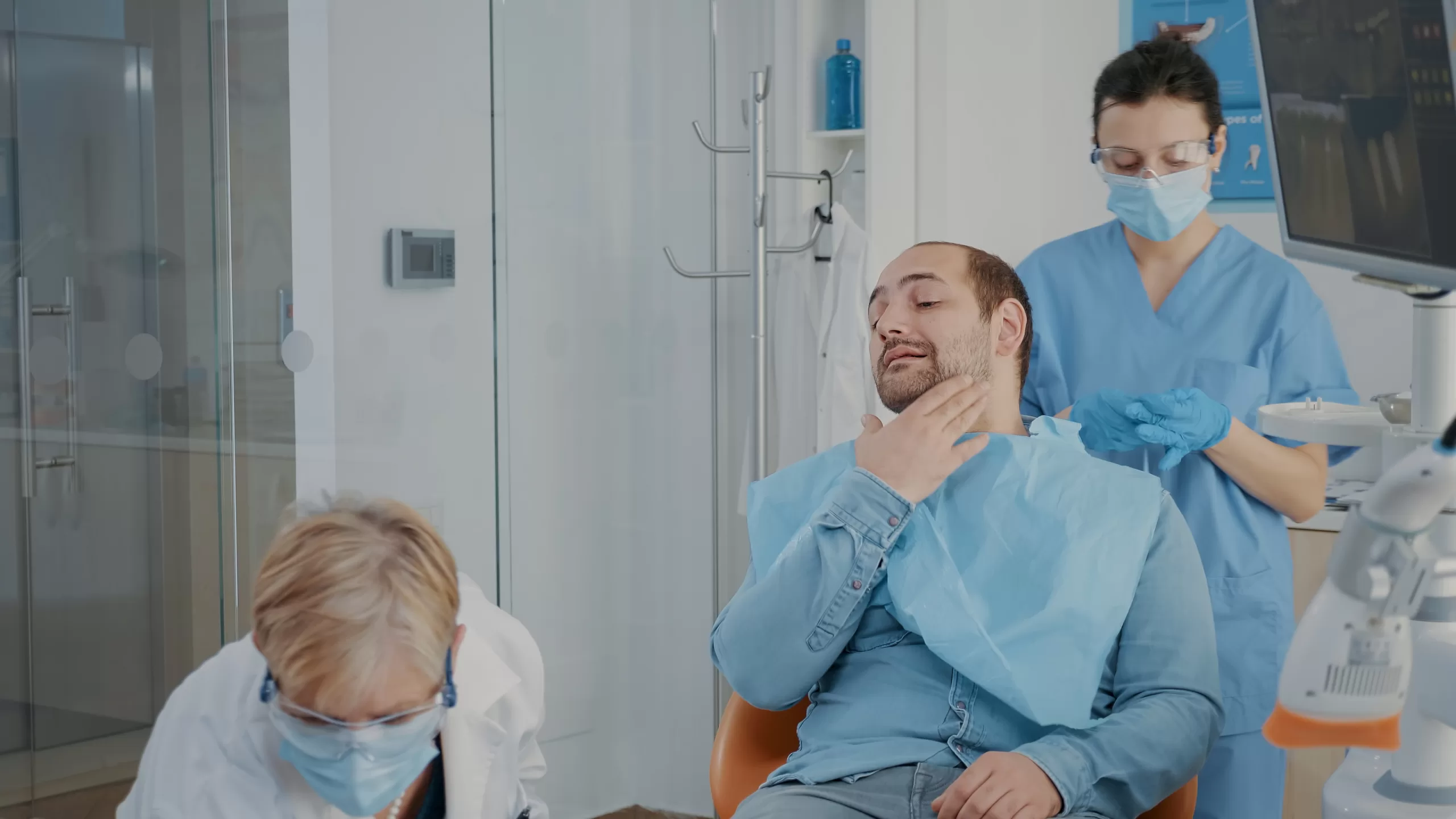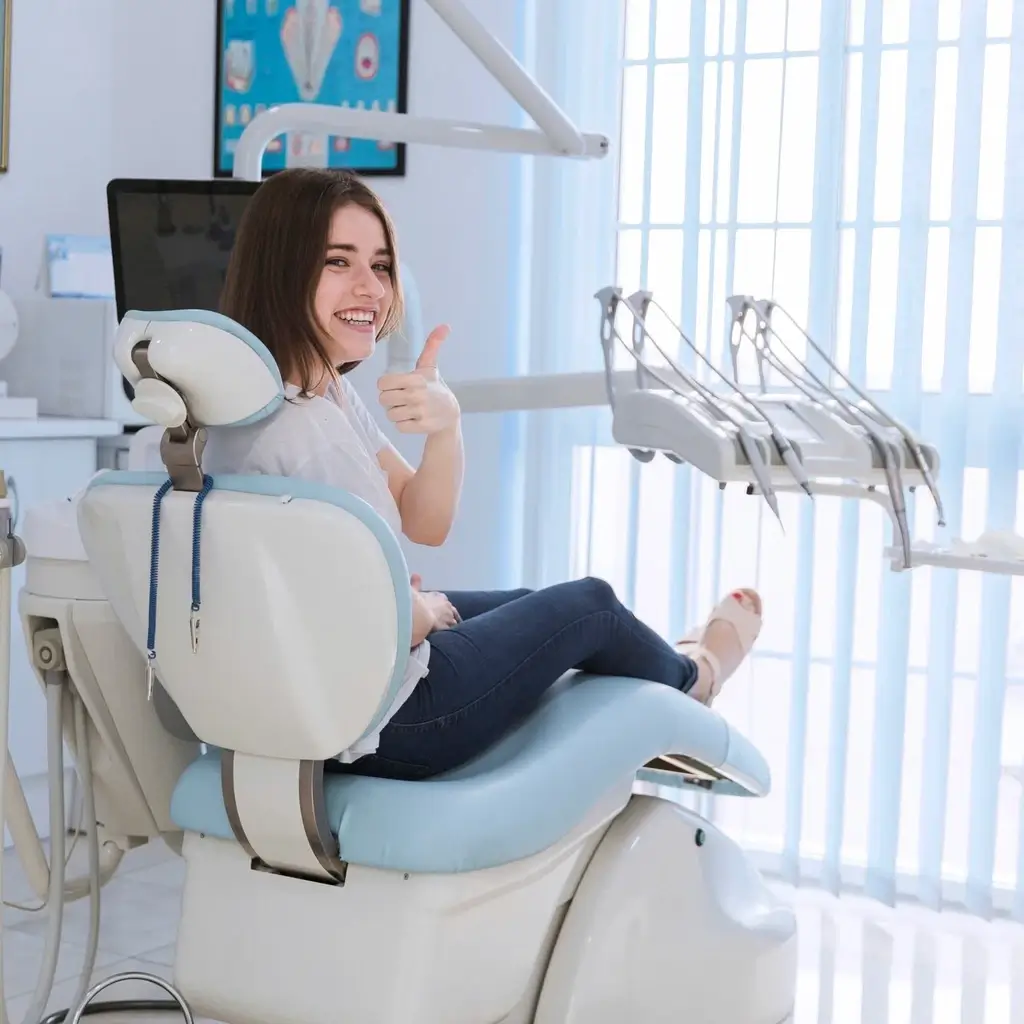Fear of going to the dentist is a common reason for not having regular dental visits. Be it fear of pain, needles, or other dental procedures, it is a valid fear that is often overlooked or undermined in kids as well as adults.
At Ridge Oral Surgery, we believe that comfort matters as much as outcomes. We understand the importance of specialists providing proper guidelines and encouraging communication. Once the root of fear is understood, patients can feel more at ease with the procedures.
At our clinic, we ensure that your experience is as comfortable as possible. We provide different options for anesthesia and sedation, which you can choose from with consultation from your dentist, according to your requirements.
What Is Oral Anesthesia?
In the context of dental or oral biopsy, oral anesthesia helps to numb the area to avoid discomfort or pain. It includes injecting the anesthetic into the area that needs work to prevent sensitivity.
There are three types of dental anesthesia required in oral biopsy:
- Local anesthesia
- IV sedation
- General anesthesia
They are vital in different procedures. Local anesthesia and IV sedation are usually used during minor surgeries, which require the patient to be aware of the surroundings. Whereas general anesthesia causes the patient to be completely unconscious. It is usually required in major surgeries.
One of the major reasons behind people fearing dental surgeries is the pain. Anesthesia comes in handy not only to provide comfort to the patient but also to carry out the surgery successfully. It also minimizes the patients’ stress response during the procedure, thus keeping the pain and vital signs under check.
Types of Oral Anesthesia Used in Oral Surgery
Different types of anesthetics have different uses in surgery. At Ridge Oral Surgery, you can talk to your dentist to figure out what will work best for you, depending on the surgery you need.
- Local Anesthesia
This type of dental anesthesia is used when a small part area needs to be treated. During this procedure, the patient usually remains alert but does not feel any pain. It is usually used for extractions, biopsies, and minor surgeries.
- IV Sedation (Conscious Sedation)
When IV sedatives are used to keep patients slightly conscious. It might make you feel drowsy and relaxed, but you will be awake enough to respond to your dentist. IV sedation is ideal for moderate oral surgery procedures.
- General Anesthesia
General anesthesia is needed during major surgeries. During this procedure, the patient remains completely unaware of the surgery and does not feel pain as they are fully unconscious. This type of anesthesia is reserved for complex or lengthy surgeries.
- Nitrous Oxide (Laughing Gas)
Nitrous oxide, or laughing gas, is a good pain reliever. Usually, oral surgeons favour it for its prompt function and short-lasting effects, and is commonly used with other medications. It is often used for mild procedures or pediatric patients.
Here is a comparison chart for quick scanning (anesthetic type vs. level of sedation vs. use cases):
Is Oral Anesthesia Safe? What Patients Should Know
We take the required measures to ensure that a patient is fit for surgery and anesthesia. This is done to monitor the patient’s vitals through pre-op screening and post-op care.
Pre-op or pre-operative screening is carried out to assess the patient’s health status and identify any risk. Post-operative screening is done to ensure a complete recovery and take care of any complications that may arise.
Dental care at Ridge Oral Surgery is about comfort and care. We offer our best and most advanced clinical technology that certifies predictable outcomes and ensures proper recovery. Our technology includes secure EMR, radiography, cutting-edge in-house 3-D imaging, and advanced surgical instruments that allow precision.
Our team includes professionals specialised in the technologies and “board-certified professionals” who help us to warrant complete care and support.
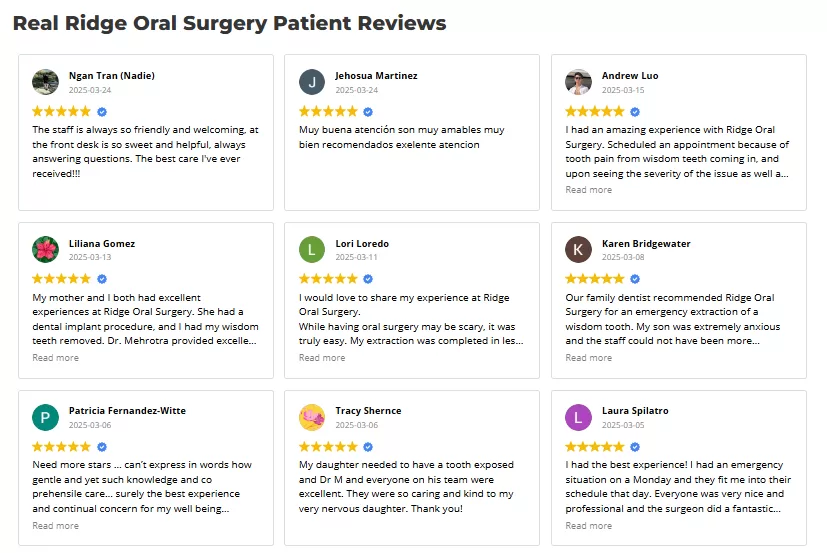
On our reviews page, we are overwhelmed with positive feedback about the successful and pleasant experiences from our patients.
Common Procedures That Use Oral Anesthesia
Numerous dental procedures, including oral biopsy, gum surgeries, and dental restoration surgeries, use oral anesthesia to numb the affected portion. Other common procedures that use anesthesia are:
This is the most common form of dental care that uses anesthesia to numb the portion around the tooth that needs to be extracted.
Removing wisdom teeth is a painful process that includes applying an anesthetic around the area of the faulty wisdom tooth.
It is a method that requires repairing damaged bones using transplants.
- Dental implants
Damaged or missing teeth are replaced with dental implants. It is considered a safe procedure due to the numbing effects of medications.
- Biopsies
An oral biopsy is a diagnostic procedure to identify any health complications.
How to Prepare for Oral Anesthesia (Patient Checklist)
- Pre-surgery fasting
Doctors usually instruct patients not to eat or drink for a few hours before the surgery. Talk to your oral surgeon to learn how long you need to fast, which depends on the type of surgery.
- Medication instructions
You should be upfront about your medications and allergies to help your dentist make changes in your medications if needed.
- Transportation planning
It is better to have someone accompany you to the appointment since you will be sedated and unable to drive.
- Post-op care expectations
While post-op care is mostly the responsibility of the oral surgeons, you should talk to your dentist about the post-op procedure to be safe.
Why Choose Ridge Oral Surgery for Anesthesia in Oral Surgery?
Among the panorama of suburban lifestyle and greenery, Ridge Oral Surgery at Basking Ridge, New Jersey has grown to care for many patients and carried them towards better dental health. Rich with heritage, it is the ground of eminent educational institutions and a communal society.

We assure you of your safety and discuss your health beforehand to understand what works best. Ridge Oral dentists and oral surgeons in the New Jersey centre will accompany you through all the sedation options available and choose what’s ideal.
The Ridge Oral Surgery team is complete with experienced and friendly professionals skilled in the advanced technologies we provide.
FAQs About Oral Anesthesia
- Will I feel anything during the surgery?
Depending on the anesthesia, you might be slightly conscious or completely unconscious, but you will not feel any pain or uneasiness. - How long does anesthesia last?
Local anesthesia, which is required for minor surgeries, wears off after a few hours. However, general anesthesia used during serious surgeries may last for even 24 hours. IV pain medications usually last for 8 hours. - Can I drive afterwards?
For your safety, it is recommended that the patient put under anesthesia should not drive, and should be accompanied by someone. - What are the side effects?
While anesthesia is usually safe, it can evoke side effects of sore throat, nausea, vomiting, dry mouth, and dizziness. In rare cases, you can get itching, chills, and muscle aches. In serious cases like allergic reactions, you must contact a doctor oran oral surgeon in New Jersey immediately.
Experience Safe, Expert Oral Anesthesia at Ridge Oral Surgery
Ready to take the next step towards better dental health? Call now and book your dental consultation today!
You can also contact us at our phone number 908-895-6455 or at our address 175 Morristown Road, Ste. 103, Basking Ridge, NJ 07920 from Monday to Friday from 7:30 am to 5:00 pm and on Saturdays from 8:00 am to 12:00 pm.
Before making a consultation call for an oral biopsy in the New Jersey centre, please be informed about the insurance plans that we accept. While dental insurance can assist in payment, there will be extra expenses you might need to pay during our service.

